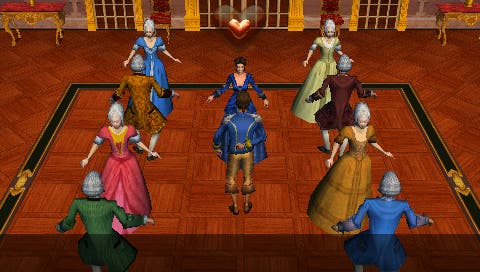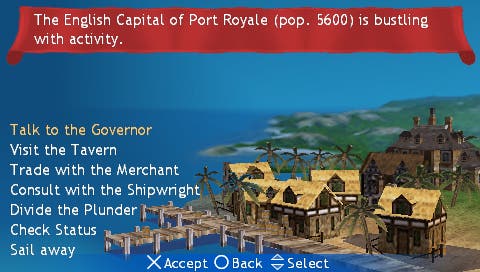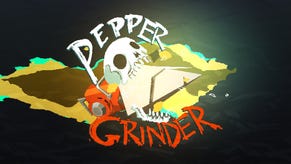Sid Meier's Pirates!
Privateer aye.
In many ways videogame critics are a bit like bum-bagged, Polaroid-snapping tourists. We dash from game to game, scribbling down points of interest with furious scrawl; we take scattergun snapshots of the defining architecture and characters from illuminating angles as we listen to PR tour guides pointing out with practised turn-of-phrase the game's outstanding, unusual facts and histories. Finally, we write down our thoughts for the folks back home before heading for the minibus and the next new attraction. You see, like tourists, videogame critics rarely visit a game for any more than is absolutely necessary. Time is money and no sooner is a game spent than most of us are on to the next one.
The point of that tortured but unexpectedly perspicacious simile is to, in a roundabout way, pay Sid Meier a massive compliment – speaking in the capacity of videogame critic rather than English-heritage tourist of course. His latest PSP adventure, the possessively-monikered Sid Meier's Pirates (perhaps his mum thought it might lost amongst the other boys' Pirate games if it didn't have its own nametag) is the first title on the system which has turned this reviewer from short-term visitor to long-term resident. Put simply, Eurogamer has still been playing Pirates long after the ink had dried on the review – a rare thing indeed.
The smarter ones amongst you might be wondering how such a time-travelling critical declaration can hold up when we're only two paragraphs in. But rest assured: having written the review, we found ourselves still playing on the bus, on the train, in the toilets at work, and so returned to rework this introduction to reflect our unusual experience - an occurrence which speaks as a louder recommendation than any number of orthodox, adulatory adjectives.
Sid Meier's Pirates is a conversion of 2005's PC and Xbox game, which is itself a remake of an ancient PC game. Nevertheless, the protracted journey from port to port has left the game none the worse for wear and, in many ways, in the PSP it may have found the perfect place to settle down. Pirates and galleons, like ninjas and Japan or plumbers and the Mushroom Kingdom, are over-familiar characters and settings in the videogame canon. Nevertheless, it's testament to the robust execution of Meier's vision that the game's mechanics are still sweetly fresh and utterly compulsive twenty years later.

You begin the game as a young buccaneer, the Gulf Coast, Caribbean and the tip of South America for a watery playground. You have a sword, ship, small band of dedicated sailors and a hazy vendetta against someone or other who has kidnapped your related someone or other. The overarching mission to get your loved ones back and wreak revenge on the perpetrators can be clearly and logically advanced by way of set mini-missions but, mostly, the game is very open-ended and you're free to carve out a dark name for yourself at a leisurely pace.
Your interactions with the game come from a fairly limited but immensely satisfying palette: raiding and plundering ships, upgrading your stolen ships with larger cannons and faster sails, playing off the game's four nations against each other, selling your ill-gotten goods for profit on the open market, uncovering treasure maps and seeking out buried riches, hiring and firing sailors and, all the while, climbing the 1600's leaderboard of most-dastardly sea-dogs. The more famous you become the more competent the sailors that wish to join your crew are, the faster your ship can fire in skirmishes.
Indeed, battling other galleons is one of the brightest gameplay jewels here. There are two ways to take on other ships (and, of course, you must strategically choose who it is most beneficial to attack at any one time - the English, French, Spanish, Dutch, locals Indians or other Pirates). The simplest way is to simply trade cannon fire - gradually ship's hulls and sails will degrade and the first one to deplete the other's wins the fight. The only problem with this technique is that, should you choose to acquire their vessel after the gunpowder and splinters settle, you'll have to pick up the repair bill for both ships. As such it's more beneficial to just ram into their boat, jump aboard and duel with its captain. A rudimentary set of sword (and, later, gun) fighting moves are available to you and, if you manage to force your opponent back far enough, you'll have taken his ship and crew by force with no damages incurred.
As time progresses linearly through the game your character also ages and matures and, in keeping with the perks/ pitfalls of growing up, you must find yourself a bride. Each port on the map has its own governor who, inevitably, has his own eligible daughter. These are helpfully categorised into tiers of attractiveness from 'Plain' (read: lobotomised) through to 'Beautiful' (read: moisturised). You must court these girls by bringing gifts, successfully dancing with them in a rudimentary rhythm action mini-game, and, eventually, killing off their other suitors and, rescuing them from a rival kidnapping pirate.

After a couple of years at sea (the average trip from harbour to harbour takes around two months of in-game time for which you'll need ample food supplies) your crew grow restless and you'll need to divide up the bounty and start anew. You get to keep your flagship (ships can be switched between with a flick of the L-trigger even while at sea so can quickly find your favourite) but all the other ships you've amassed must be sold on.
These natural breaks help provide a framework to the free-roaming nature of the game and, as time progresses, your affiliations and disputes with nations and ports will solidify. You'll either be able to find cheap rest and upgrades with them, or alternatively will be fired upon when you draw close.
In a sense, Pirates is a limited game built from a small stock of gameplay blocks and populated by a strangely uniform cast. For example, many of the character models in the game are identical to one another - perhaps with a different shade of skin colour to distinguish them. But, even considering the occasional glitch where a ship sails right across land, somehow everything comes together to represent much more than the sum of its parts. The tone of the game is perfect and the colours used, stretched out elegantly across the PSP's ocean-wide screen, makes for one of the most inviting gameworlds we've yet enjoyed on the handheld.
Pirate's short-burst mission structure makes for perfect on-the-go gaming where, perhaps, it might have become more quickly tiresome on a home console or PC. It's unashamedly one of the PSP's brightest, most endearing, beguiling and long-lasting games, and its protracted residency in our PSP slot this month speaks as a louder recommendation than any number of orthodox, adulatory adjectives.








